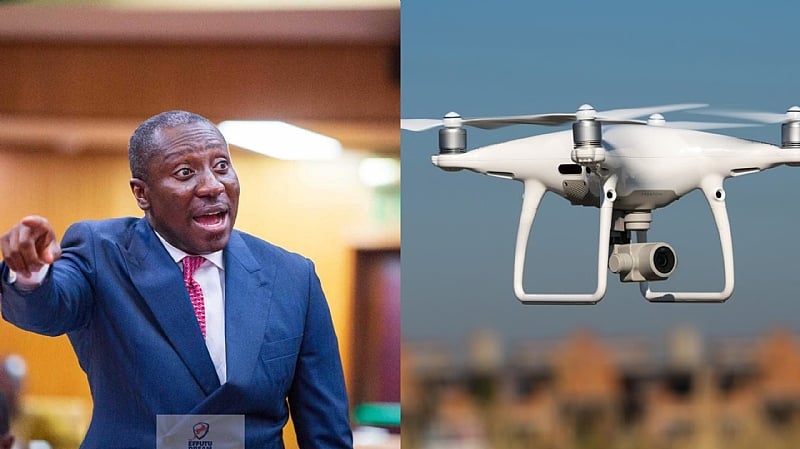The political landscape in Ghana has recently witnessed a clash between Minority Leader Alexander Afenyo-Markin and Foreign Affairs Minister-nominee Samuel Okudzeto Ablakwa, sparking allegations of surveillance and raising questions about the propriety of such actions. Afenyo-Markin has accused Ablakwa of leading a team, known as Operation Recover All Loot (ORAL), in conducting unauthorized surveillance of his private properties using drones. This alleged surveillance reportedly targeted multiple locations, including Afenyo-Markin’s beachfront property in Winneba, his residence in Abelenkpe, and other undisclosed locations. The Minority Leader claims to have been aware of these activities for some time, having been informed by associates who witnessed the drones. He asserts, however, that he chose not to publicly address the issue earlier, maintaining that he has nothing to hide and that all his assets were acquired legally.
The controversy erupted following Ablakwa’s public disclosure of details concerning Afenyo-Markin’s properties during his vetting process for the ministerial position. Afenyo-Markin alleges that prior to the vetting, he and Ablakwa had a private conversation where they discussed the matter. He claims to have expressed concerns to Ablakwa about the surveillance, suggesting that certain concessions on Ablakwa’s part would smooth the situation over. Despite this alleged conversation, Afenyo-Markin claims that the drone surveillance continued unabated, leading him to conclude that his concerns were disregarded. This perceived breach of trust, coupled with the public airing of his private property details during the vetting, has escalated the situation into a public confrontation.
Afenyo-Markin provided specific instances of the alleged drone activity. In Winneba, he described how a drone was allegedly flown over his beachfront property, originating from a community center near the shoreline. He claims that his associates witnessed this incident and informed him. Similarly, he described instances of drone activity near his Abelenkpe residence, claiming that both he and police officers have observed drones flying in the vicinity, leading them to suspect surveillance. He questioned the justification for such activity near the residence of the Minority Leader, highlighting the perceived intrusion and raising concerns about potential motivations behind the alleged surveillance.
Central to the dispute is the question of the legality and ethical implications of the alleged surveillance. Afenyo-Markin insists that all his properties were acquired through legitimate means, and he challenges the justification for the drone operations, framing them as an invasion of his privacy. He characterizes the actions of the ORAL team as overzealous and potentially politically motivated, particularly given the timing of the surveillance in relation to Ablakwa’s ministerial vetting. The public airing of his private property information during the vetting further fueled Afenyo-Markin’s suspicions, leading him to question Ablakwa’s intentions.
Further complicating the matter are allegations raised during the vetting regarding the ownership of Afenyo-Markin’s lands in Winneba. Ablakwa allegedly presented a search report that suggested these lands were state-owned. Afenyo-Markin vehemently denies this claim, asserting that the lands are rightfully his. This disagreement adds another layer of complexity to the already tense situation, raising questions about the accuracy of the information presented during the vetting process and potentially casting doubt on the motivations behind the allegations. The conflicting accounts underscore the need for a thorough and impartial investigation into the matter to determine the veracity of the claims and counterclaims.
This clash between Afenyo-Markin and Ablakwa highlights the delicate balance between legitimate investigations and the protection of individual privacy rights. The use of drone technology for surveillance raises important questions about the extent to which government agencies can monitor citizens, particularly public figures. The controversy underscores the need for clear guidelines and regulations regarding the use of surveillance technology to ensure that it is employed responsibly and ethically, respecting the fundamental rights of individuals while also allowing for legitimate investigations to proceed. The outcome of this dispute will likely have implications for future surveillance practices and the protection of privacy rights in Ghana.


